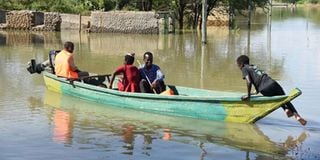Could Britons now become refugees from climate change?

A boat operator ferries passengers at a flooded Loruk Trading Centre in Baringo County on Tuesday after Marigat-Loruk road was cut off due to rising water levels in Lake Baringo.
What you need to know:
- People living in tiny Fairbourne, which has 450 houses, a pub, a post office and several shops, have been told by the government that they will have to leave their homes because of the threat of sea level rises and flooding linked to climate change.
One day, climate change will turn Britons into refugees! Nonsense? Let’s see.
There’s much talk about Fiji, where sea levels are rising and people have had to abandon their homes and build again on higher ground. It’s sad, of course, but Fiji is in the Pacific Ocean, far from temperate nations like Britain.
On the other hand, from the freezing Arctic come reports that a chunk of ice the size of Manhattan Island has broken away from the last remaining ice shelf, while at the other end of the planet, water that has melted from the Antarctic’s ice shelves since 1994 could just about fill America’s Grand Canyon.
A 2018 survey by the US Pew Research Centre showed that a sensible 71 per cent of Kenyans perceived climate change as a major threat to their existence. Could this result have anything to do with reports that silting-up has caused the Rift Valley lakes of Baringo and Bogoria to come dangerously close to each other? If saline Bogoria should flow into crystal Baringo, the effects on farming communities could be disastrous.
The Pew survey showed that 66 per cent of Britons considered climate change a major threat while 7 per cent did not. I wonder if that 7 per cent figure might now shrink in view of reports from a coastal village in Wales.
Flooding
People living in tiny Fairbourne, which has 450 houses, a pub, a post office and several shops, have been told by the government that they will have to leave their homes because of the threat of sea level rises and flooding linked to climate change.
The deadline is not for another 34 years but this will surely narrow if seas continue to rise. House prices in the village have already plummeted and residents cannot look to the local government for assistance.
A council spokesman said, “In the long run, maintaining and increasing flood defences would not only be costly but could also lead to increased risk to life should the defences fail.”
* * *
Nice to catch up with Brother Peter Tabichi, Kenya’s Franciscan friar who won the 2019 Global Teacher Prize worth $1 million.
A science master at Keriko Secondary School in Nakuru, Peter paid his first visit to London recently and told the magazine Bible Alive about how he is using the prize money. He is seeking to promote educational opportunities, not just for pupils at his own school, but in poor areas throughout Kenya.
A couple of weeks ago, he took a group of students to the International Science and Engineering Fair in Phoenix, Arizona, USA, and there will be other school outings in the future.
Writer Joanne Moorhead met Kenya’s star teacher at the London offices of the Prize sponsor, the Varkey Foundation, where he talked about successes achieved by pupils at Keriko.
What is key, he said, is convincing low-achieving children that they have talents of their own.
“When they know you believe in them, then they start to believe in themselves,” Peter said. “That’s how you unlock their potential.”
Low achievers
Crucial to his thinking is the Talent Nurturing Club he started at Keriko.
“Some pupils were low achievers and thought they couldn’t do anything. But they came along to the club and we realised they could sing or they could draw. Then they started to believe in themselves and to do better.”
Brother Peter said his main achievement was simply daring to think big for the kids.
* * *
More than 75 per cent of shop workers say they have been abused when they asked customers to stay two metres apart or to wear face masks, according to a survey by the Usdaw union.
Hayley Sherry, 17, said she has been spat at, coughed on and verbally abused while working at the checkout of her local Sainsbury’s supermarket.
Face masks are mandatory in public spaces and social distancing rules require separation of two metres as part of the national effort to control the coronavirus pandemic.
The Office of National Statistics reports that 96 per cent of adults say they wear masks where required. However, union official Doug Russell told The Observer newspaper, “Levels of violence and abuse against shop workers have doubled as a result of the crisis.”
* * *
From the Department of Useless Information: Just one in five workers uses their lunch break to eat, according to a poll of 2,000 British adults. Two-thirds skip the meal altogether and most of them use the break to play on phone apps or walk their dog.
A comic on television: “They laughed when I said I wanted to be a comedian. Well, they’re not laughing now.”
Two men are having dinner in a restaurant. One says, “I went abroad on my holiday and saw a man-eating tiger.” Said the other, “So what! Right now, I’m watching a man eating chicken.”





